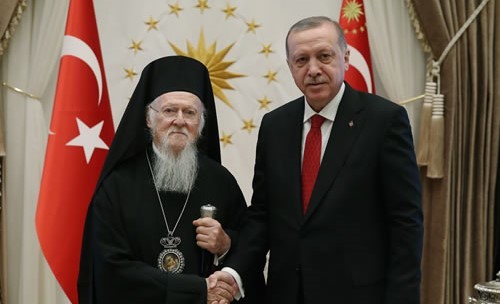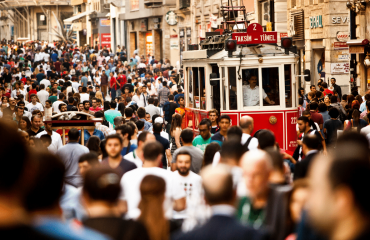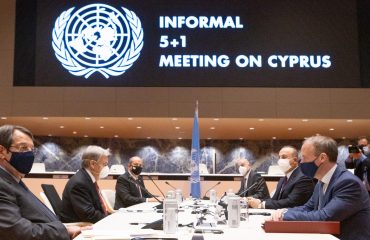

In statements they issued on May 9 and 10, representatives of non-Muslim communities in Turkey expressed their worries about potential racist attacks, asking the Turkish government to take the necessary measures to protect them. The common denominator between the statements that the Turkish Jewish Community, the Greek Orthodox Patriarchate and the Armenian Patriarchate was a specific content published by the Gerçek Hayat [Real Life] magazine.
Last week, the magazine had published a special 176-page supplement titled “100 years of FETÖ”. This magazine supplement was alleging that Turkey’s Jewish and Christian communities had raised and supported the now-outlawed organization of Fethullah Gülen – the U.S.-resident Islamist preacher indicted for the failed coup attempt of July 15, 2016. The non-Muslim communities said the publication defamed and targetted them.
There was no proof in the magazine the allegations. What the magazine highlighted was the semblance of “interfaith dialogue” between the communities and Gülen’s organization, which Erdoğan’s ruling Justice and Development Party (AKP) had also supported when they were still on good terms with Gülen. In summary, non-Muslim citizens were uncomfortable with being held guilty for supporting this outlawed group now called the “Gülenist Terror Organization” (FETÖ). Especially considering entire governments and politicians had been groveling to Gülen for years.
Reaction to this other than those of the non-Muslim community was meager. Among those who reacted were Mustafa Yeneroğlu and Mehmet Emin Erkmen from the DEVA Party. There was also the TDP (Turkey Democracy Platform), a civil group known for having explained the role of the Gülenist organization in the coup to the decision-makers in the West. In a statement the platform issued through their Twitter account, the TDP stated that they “strongly condemn the irresponsible slander that Gerçek Hayat magazine directed to the religious leaders of Jewish and Christian communities” and that “we know from our recent history what tragic outcomes such slander can have”.
Remembering September 6-7, 1955
In his Twitter account, Dr. Hüseyin Hatemi, a prominent professor of law, openly referred to the incident in “recent history” that the DTP had indirectly mentioned. “My peers and I saw the disastrous consequences when mischief and ignorance unite, on September 6-7, of 1955″, he wrote. “Gerçek Hayat magazine’s irresponsible slander against the religious leaders of the Christian and Jewish communities”, he continued, “has made our citizens within these congregations deeply anxious”.
So, let’s go back to remember what happened on September 5-6, 1955. It was a time where the Cyprus issue between Turkey and Greece had aggravated again. Upon the news that Atatürk’s birth house in Thessaloniki had been bombed, attacks were carried out, mainly in Istanbul, against the homes and workplaces of non-Muslim citizens. Of Greeks in particular. In these attacks that went on for two days, according to official data, 30 people were killed and 4212 houses, 1004 workplaces, 73 churches, 26 schools, 2 monasteries, and a synagogue were destroyed. It was later understood that the bomb attack in Thessaloniki was planned by the Turkish “deep state” structures with the purpose of provocation. It was also understood that the aggressive crowds didn’t just happen to be in Istanbul’s Beyoğlu district. They had been moved there on purpose. Following the September 6-7 attacks, non-Muslim citizens and especially Greek origin citizens, known as Roum (a term referring to their links with the Roman Empire) had accelerated their immigration abroad.
The remembrance of September 6-7 is striking. There were threats against synagogues in near past. Recent complaints about threatening inscriptions on certain churches’ doors and even about an attempt to burn a church’s door had already been reported to the police. The Patriarchate informed that a mentally unstable person was responsible for some of these actions. But as the saying goes, the devil looks after his own; knowing this doesn’t reduce anxiety.
Why the publication triggered worries
Because Gerçek Hayat magazine is not an edgy, unknown publication published by marginal types. It belongs to Ketebe Publishing, which is part of the Aybayraklar Media Group, which also published pro-government Yeni Şafak [The New Dawn] daily. The licensee is Mustafa Aybayrak and the Editor in Chief is Burhan İstenci. The Gerçek Hayat magazine doesn’t only target non-Muslim communities in Turkey; they also frequently publish anti-Atatürk content, since the founder of Turkish republic is not favored by most of Islamist for abolishing Khalifate and adopting secular rule. Historian Mustafa Armağan, who is a strong supporter of that Turkish-Islam conservatism is among the editorial advisors of the magazime, who is also among editors and writers of another magazine by the same Albayrak Media Group, “Derin Tarih”, the “Deep History”.
Therefore, the people who made the “non-Muslims in Turkey had backed FETÖ” claim are not irrelevant people. Quite the contrary: they are on the payroll of a media group which is among the most favored by the AKP governments. The sources I spoke to during my investigation on this issue have said that the issue had been conveyed to President Tayyip Erdoğan.
Aybayraklar Holding doesn’t only deal with the media. Notably, it’s also known for the tenders it received from the Istanbul Metropolitan Municipality (IBB), especially when AKP still held the municipality. However, we understand that the group’s business with the IBB was sustained even after the opposition Republican People’s Party’s (CHP) Ekrem İmamoğlu became Istanbul Metropolitan Mayor, still continues. As Turkish citizens may remember, İmamoğlu had canceled the car rental tender that Aybayraklarlar Holding previously held because it was “wasteful”. It is reported, however, that by lowering the number of vehicles, Adem Altunsoy, son-in-law of Albayraklar Holding Vice president Nuri Albayrak, had won the re-opened tender with his Platform Turizm firm.


